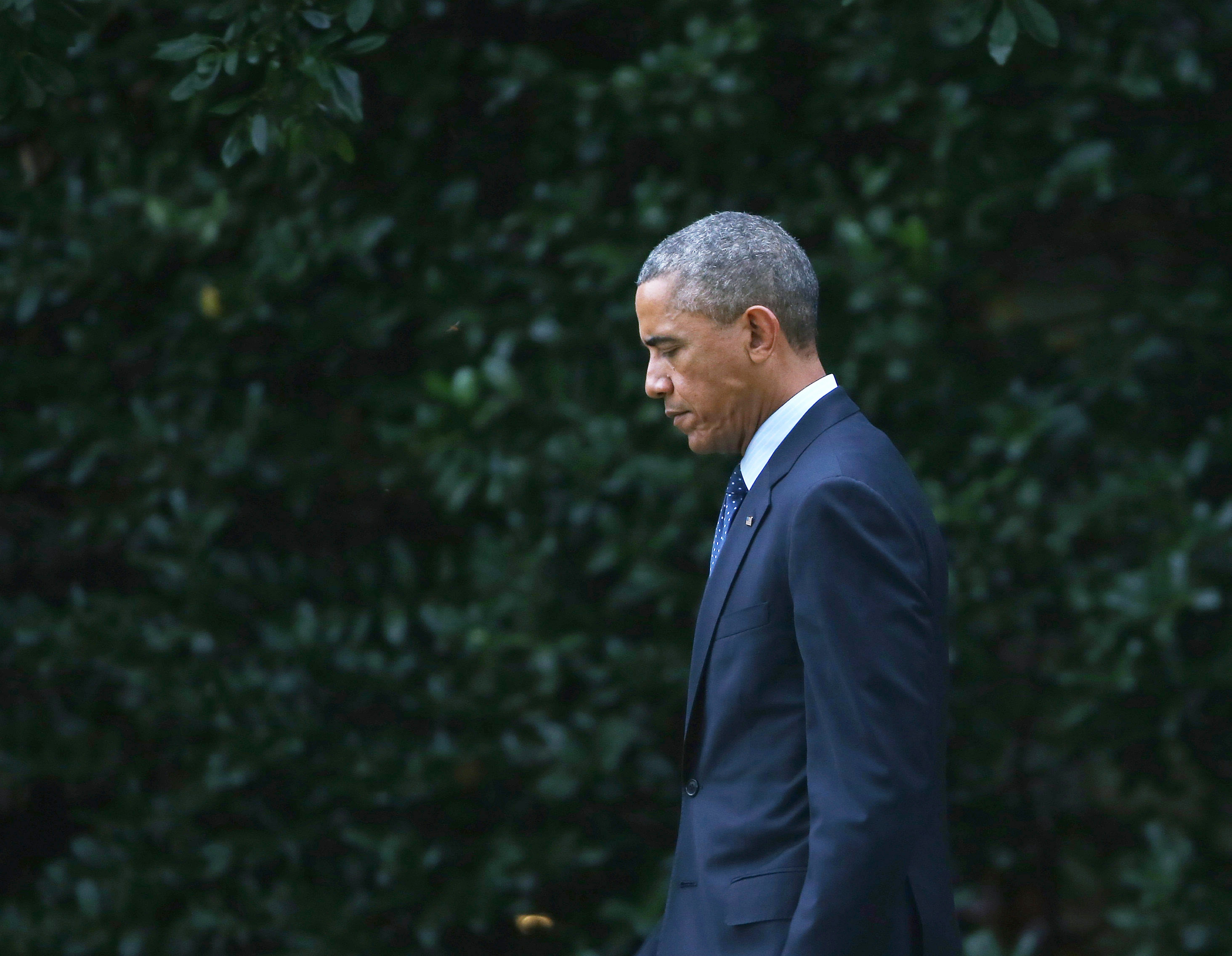Obama's war-powers farce: If you want to limit presidential power, don't start illegal wars
The rule of law starts at home


President Obama is seeking a new Authorization for Use of Military Force, as the U.S. continues its bombing campaign against the Islamic State. It comes just a tad late: about three and half months after it was necessary, according to the War Powers Act. This raises the question: Why is he even bothering?
Matt Yglesias, following on the heels of his interview with the president, argues that this drive for a new AUMF is about limiting presidential power, because it would introduce a more limited legal framework for future wars. I don't doubt that's a major part of the administration's rationale. Scrambling to hem in the next person's ability to do stuff you consider bad is a traditional end-of-presidency activity.
But as Greg Sargent points out, this is closing the barn door after the horse has bolted. When it comes to legal limits on the president's authority to start new wars, Obama has already blown a hole in them big enough to drive through an aircraft carrier.
Subscribe to The Week
Escape your echo chamber. Get the facts behind the news, plus analysis from multiple perspectives.

Sign up for The Week's Free Newsletters
From our morning news briefing to a weekly Good News Newsletter, get the best of The Week delivered directly to your inbox.
From our morning news briefing to a weekly Good News Newsletter, get the best of The Week delivered directly to your inbox.
If the president wanted to stop President Cruz's future wars of aggression, he should have done so in 2011, when he started his first illegal war in Libya. The War Powers Act, as commonly interpreted, says that the president can use force for 60 days without congressional authorization, and if he doesn't get it, then he has to stop hostilities within 30 days.
Even that might not have passed legal muster in Libya, because the law states that any unauthorized use of force has to be in response to "a national emergency created by attack upon the United States, its territories or possessions, or its armed forces."
At any rate, Obama casually blew off the 90-day limit anyway. The Justice Department's Office of Legal Counsel is supposed to be the authoritative voice on legal interpretation for the executive branch, but when the OLC insisted the War Powers Act applied in this situation, Obama ignored the lawyers and brought in political hacks to cook up another rationale. Eventually they settled, ludicrously, on arguing the new war didn't really constitute "hostilities." When Congress refused to pass a new AUMF, he ignored that, too.
The latest war with the Islamic State has followed the same script, except this time Obama is claiming it's the 2001 AUMF that covers the use of force. Though somewhat less preposterous than the Libya case, it's still nonsense. That statute is clearly directed at those who "planned, authorized, committed, or aided " the 9/11 attacks, and the Islamic State didn't even exist in 2001.
Of course, the 2001 AUMF has turned into a blank legal check for dirty wars around the globe, and Obama's proposal leaves it in place, making this whole exercise pointless. As Jameel Jaffer of the ACLU told Sargent:
"If you don’t repeal the original AUMF, you create the possibility the president will continue to rely on it," Jaffer said. "Any limitations Congress imposes under the new AUMF could be ignored. This is a meaningless exercise unless it includes repeal of the original AUMF." [The Washington Post]
Finally, there's the political reality. Congressional restrictions on presidential power are only as good as Congress' willingness to act when the restrictions are breached. And right now there is approximately zero reason to think that Congress gives a crap about illegal war. In response to Libya, Congress should have threatened to remove him from office. But the best it could do was offer some annoyed muttering, which lapsed into virtual silence by the time Obama turned to the Islamic State.
In other words, in today's political climate, Obama is basically asking for the authority to start war against anyone who's watched an Islamic State video. Indeed, the main axis of debate is whether the proposed authority is broad enough. Except for Sen. Rand Paul, Republicans are basically fine with Obama being able to make war wherever he wants.
So until Congress starts caring about fulfilling its constitutional prerogatives, lawmakers might as well save their breath when it comes to new authorizations.
A free daily email with the biggest news stories of the day – and the best features from TheWeek.com
Ryan Cooper is a national correspondent at TheWeek.com. His work has appeared in the Washington Monthly, The New Republic, and the Washington Post.
-
 Acid rain is back: the sequel nobody wanted
Acid rain is back: the sequel nobody wantedUnder The Radar A 'forever chemical' in rainwater is reviving a largely forgotten environmental issue
-
 Book reviews: 'Clint: The Man and the Movies' and 'What Is Wrong With Men: Patriarchy, the Crisis of Masculinity, and How (Of Course) Michael Douglas Films Explain Everything'
Book reviews: 'Clint: The Man and the Movies' and 'What Is Wrong With Men: Patriarchy, the Crisis of Masculinity, and How (Of Course) Michael Douglas Films Explain Everything'Feature A deep dive on Clint Eastwood and how Michael Douglas' roles reflect a shift in masculinity
-
 Recreation or addiction? Military base slot machines rake in millions.
Recreation or addiction? Military base slot machines rake in millions.Under the Radar There are several thousand slot machines on military bases
-
 Ghislaine Maxwell: angling for a Trump pardon
Ghislaine Maxwell: angling for a Trump pardonTalking Point Convicted sex trafficker's testimony could shed new light on president's links to Jeffrey Epstein
-
 The last words and final moments of 40 presidents
The last words and final moments of 40 presidentsThe Explainer Some are eloquent quotes worthy of the holders of the highest office in the nation, and others... aren't
-
 The JFK files: the truth at last?
The JFK files: the truth at last?In The Spotlight More than 64,000 previously classified documents relating the 1963 assassination of John F. Kennedy have been released by the Trump administration
-
 'Seriously, not literally': how should the world take Donald Trump?
'Seriously, not literally': how should the world take Donald Trump?Today's big question White House rhetoric and reality look likely to become increasingly blurred
-
 Will Trump's 'madman' strategy pay off?
Will Trump's 'madman' strategy pay off?Today's Big Question Incoming US president likes to seem unpredictable but, this time round, world leaders could be wise to his playbook
-
 Democrats vs. Republicans: which party are the billionaires backing?
Democrats vs. Republicans: which party are the billionaires backing?The Explainer Younger tech titans join 'boys' club throwing money and support' behind President Trump, while older plutocrats quietly rebuke new administration
-
 US election: where things stand with one week to go
US election: where things stand with one week to goThe Explainer Harris' lead in the polls has been narrowing in Trump's favour, but her campaign remains 'cautiously optimistic'
-
 Is Trump okay?
Is Trump okay?Today's Big Question Former president's mental fitness and alleged cognitive decline firmly back in the spotlight after 'bizarre' town hall event
